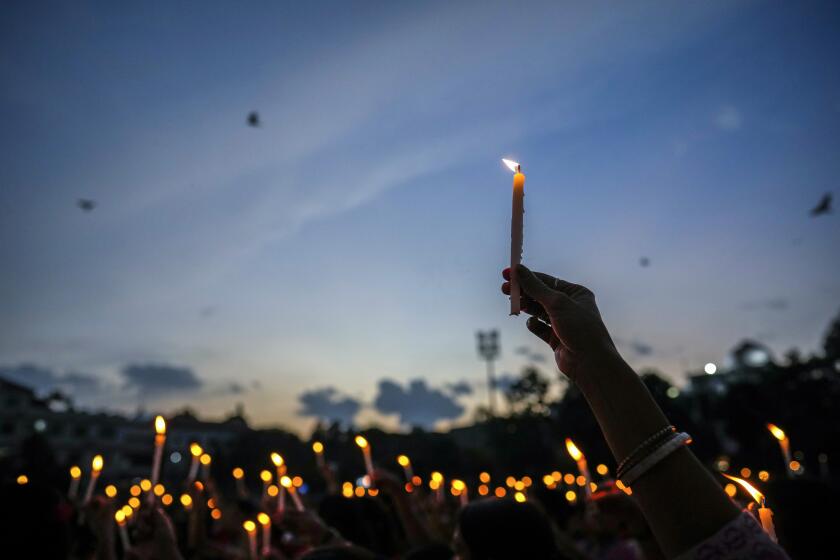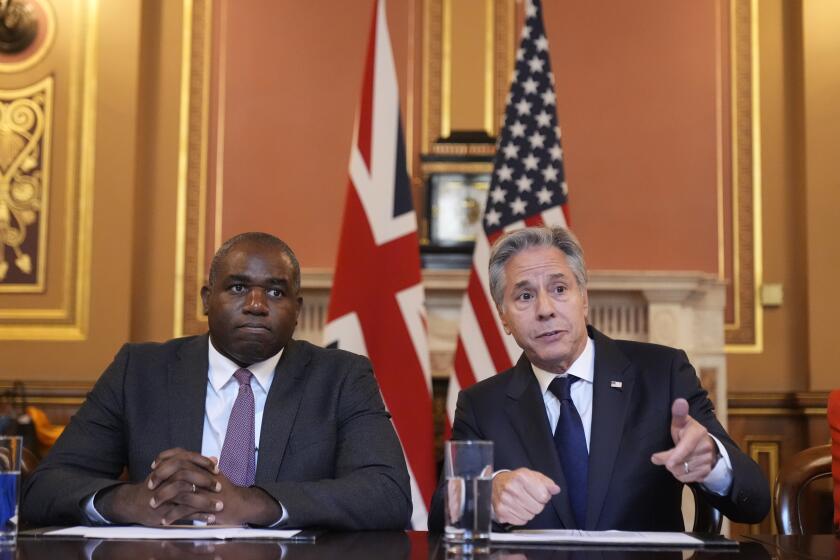South Sudan independence vote stokes concerns
Sudan is less than four months away from a vote that is expected to break it into two countries, a move that could spark another civil war and imperil the Obama administration’s efforts to calm a troubled swath of East Africa marked by tribal conflict, oil wealth and gunrunning.
The largely animist and Christian south is expected to vote in January to secede from the mostly Muslim north, the culmination of a 2005 peace treaty that ended more than two decades of civil war that left 2 million dead. But there are worries that President Omar Hassan Ahmed Bashir’s ruling National Congress Party may stymie the referendum because 80% of the nation’s oil reserves might go to the south once new borders were drawn.
President Obama, accused by critics of backing down on campaign promises to get tough on Bashir’s corrupt and violent government, is expected to attend a special United Nations meeting Friday on Sudan.
The White House has offered the government in Khartoum a number of incentives, including lifting of sanctions, debt relief and normalized relations with Bashir, who has been indicted by the International Criminal Court in The Hague on charges of crimes against humanity over years of bloodshed in Sudan’s Darfur region.
“This is really a make-or-break period for Sudan,” said retired Air Force Maj. Gen. Scott Gration, the U.S. special envoy to Sudan, in a recent State Department media briefing. “We must ensure that the parties make those tough decisions to find agreements, to implement those things that have to be done so that there can be a peaceful and an on-time referendum, and also to avoid the potential for war.”
Much remains to be done before the Jan. 9 referendum. There are problems over voter registration. No deal has been reached on how billions of dollars in oil revenues would be shared. And no clear borders have been agreed upon, most notably in the oil region of Abyei, where Bashir’s government is blamed for manipulating tribal animosities and political mistrust between north and south.
“Both sides declare they will fulfill their promises, but I don’t think the referendum will happen on time,” said Azhari Alhaj, a Sudanese human rights activist. “Nothing has progressed yet. Maybe the NCP doesn’t want independence. They want to kill time. They are very clever. They can buy people off.”
Washington’s foreign policy agenda has been weighted toward Iraq and Afghanistan, but a new north-south civil war in Sudan could lead to a prolonged international crisis. It would exacerbate the conflict in Darfur, where hundreds of thousands have died in recent years. And it would have wider regional implications stretching to the Horn of Africa, where the White House is attempting to contain Al Qaeda-linked militants fighting to overthrow the government in Somalia.
Bashir’s government has said it will allow the independence referendum to go ahead. Top Sudanese officials have criticized Washington in recent days for interfering in the country’s domestic affairs. But the ruling party also appears to be attempting to hamper the vote with bureaucratic delays.
The semiautonomous government in the south is run by former rebels with the Sudan People’s Liberation Army, which battled Khartoum’s forces for nearly 22 years after rejecting the imposition of Islamic law and refusing to give up water and oil resources. It has vowed to hold the referendum on time.
“The weight of our history, the depths of our people’s suffering and corresponding expectations, the promises of their leaders both in the north and south and the guarantees of the international community create no space for wavering on this,” South Sudan President Salva Kiir said last week. “There is without question a real risk of a return to violence on a massive scale if the referendum does not go ahead as scheduled.”
The Bush administration helped end the civil war in 2005 with the Comprehensive Peace Agreement, which stipulated the 2010 independence referendum. Over the last 18 months, the Obama administration has been divided over how harshly to deal with Bashir. The current package of incentives, such as debt relief for Khartoum, is balanced with what Gration described as a “wide range of consequences” if Sudan deteriorates further.
But for many human rights activists and opposition figures, the U.S. has been too timid in forcing an end to years of killing and political turmoil, including its reaction to national elections in April that many international observers regarded as fraudulent. Opponents of Bashir also criticize Obama’s willingness to normalize relations with a leader who has been indicted in The Hague.
“I don’t trust the U.S.,” said Alhaj, the rights activist. “They support this bad regime. There’s a proverb in Arabic that fits how many feel about the U.S.: ‘When I hear your words I am happy; when I see your deeds I am sad.’”
Special correspondent Alsanosi Ahmed in Khartoum contributed to this report.
More to Read
Sign up for Essential California
The most important California stories and recommendations in your inbox every morning.
You may occasionally receive promotional content from the Los Angeles Times.










